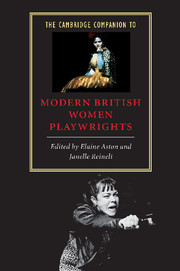Book contents
- Frontmatter
- 1 A century in view: from suffrage to the 1990s
- Part I Retrospectives
- Editors’ note
- 2 Women playwrights of the 1920s and 1930s
- 3 New plays and women’s voices in the 1950s
- 4 Women playwrights and the challenge of feminism in the 1970s
- Part II National tensions and intersections
- Part III The question of the canon
- Part IV The subject of identity
- Index
Editors’ note
from Part I - Retrospectives
Published online by Cambridge University Press: 28 May 2006
- Frontmatter
- 1 A century in view: from suffrage to the 1990s
- Part I Retrospectives
- Editors’ note
- 2 Women playwrights of the 1920s and 1930s
- 3 New plays and women’s voices in the 1950s
- 4 Women playwrights and the challenge of feminism in the 1970s
- Part II National tensions and intersections
- Part III The question of the canon
- Part IV The subject of identity
- Index
Summary
Editors’ note
Each of the chapters in this part is concerned with theatre history, and the histories of women’s playwriting within it: with understanding the changing social, political, economic, and cultural contexts in which women have been writing for theatre during the twentieth century, and assessing how their work has been both forgotten and remembered.
Feminist theatre history has been primarily concerned with the recovery of women’s playwriting previously 'hidden' by the canonical values which, for example, enshrined Shakespeare, Ibsen, and Brecht, but left out Aphra Behn, Susan Glaspell, and Marieluise Fleisser (see also our introduction to 'The Question of the Canon'). The values of an alternative, 'feminist canon', however, may also risk the elision of certain kinds of writers or writing. Thus, while feminist scholarship has been quick to claim the period of suffrage theatre at the turn of the century as a 'high point', it has, in consequence, paid far less attention to women’s writing in the 1920s and 1930s, which is de-valued as less interesting, politically (viewed as conservative rather than radical) and formally (as playwriting in the dominant realistic, rather than alternative, experimental, tradition).
- Type
- Chapter
- Information
- Publisher: Cambridge University PressPrint publication year: 2000

